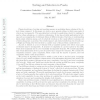Free Online Productivity Tools
i2Speak
i2Symbol
i2OCR
iTex2Img
iWeb2Print
iWeb2Shot
i2Type
iPdf2Split
iPdf2Merge
i2Bopomofo
i2Arabic
i2Style
i2Image
i2PDF
iLatex2Rtf
Sci2ools
109
click to vote
CORR
2007
Springer
2007
Springer
Sorting and Selection in Posets
Classical problems of sorting and searching assume an underlying linear ordering of the objects being compared. In this paper, we study a more general setting, in which some pairs of objects are incomparable. This generalization is relevant in applications related to rankings in sports, college admissions, or conference submissions. It also has potential applications in biology, such as comparing the evolutionary fitness of different strains of bacteria, or understanding input-output relations among a set of metabolic reactions or the causal influences among a set of interacting genes or proteins. Our results improve and extend results from two decades ago of Faigle and Tur´an, who were the first to consider some of the problems considered here. A poset is defined as a set of elements with a transitive partial order where some pairs of elements may be incomparable. A measure of complexity of a poset is given by its width, which is the maximum size of a set of mutually incomparab...
Related Content
| Added | 13 Dec 2010 |
| Updated | 13 Dec 2010 |
| Type | Journal |
| Year | 2007 |
| Where | CORR |
| Authors | Constantinos Daskalakis, Richard M. Karp, Elchanan Mossel, Samantha Riesenfeld, Elad Verbin |
Comments (0)

